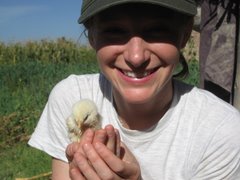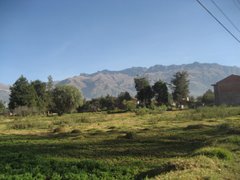
Basic San Girls with Tim!

Basic San Boys with Lex!

Adios Coch



10,000 L Rainwater Tank A bus that runs on train tracks!
A bus that runs on train tracks! Mizque Women
Mizque Women Mizque Man
Mizque Man



 Driving to the Altiplano we got to see the extreme differences in the Bolivian landscapes… The Altiplano was barren but beautiful and the people were very inviting and gracious. We spent 5 days in Huari, about 5 hours outside of Cochabamba. Here we stayed in a very simple hostel with rooms so tiny we could barely fit our suitcases inside. The doors were also very miniature and we all had to duck to get inside. The hostel had about 15 small rooms, with one pour flush toilet. Needless to say it wasn’t my cleanest week. The mornings and nights in the Altiplano were cold and my new warm sleeping bag was much appreciated. The landscape of the Altiplano was pretty amazing. The big skies reminded me of being out west. The land was flat, with mountains in the distance. There were only 2 types of vegetation, sparse grasses. The main crop there is quinoa, but it was not in season. We saw llamas, vicuñas (wild llamas) and flamingos (in the salt flats!)
Driving to the Altiplano we got to see the extreme differences in the Bolivian landscapes… The Altiplano was barren but beautiful and the people were very inviting and gracious. We spent 5 days in Huari, about 5 hours outside of Cochabamba. Here we stayed in a very simple hostel with rooms so tiny we could barely fit our suitcases inside. The doors were also very miniature and we all had to duck to get inside. The hostel had about 15 small rooms, with one pour flush toilet. Needless to say it wasn’t my cleanest week. The mornings and nights in the Altiplano were cold and my new warm sleeping bag was much appreciated. The landscape of the Altiplano was pretty amazing. The big skies reminded me of being out west. The land was flat, with mountains in the distance. There were only 2 types of vegetation, sparse grasses. The main crop there is quinoa, but it was not in season. We saw llamas, vicuñas (wild llamas) and flamingos (in the salt flats!)



